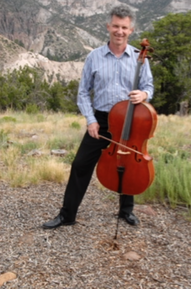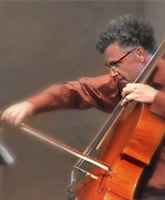 Steven Bonifazi, North 40 News Local non-profit the Church of Beethoven NoCo will be presenting a live series of indoor/outdoor classical music concerts featuring poetry this spring and summer starting Sunday, May 23 at 3 pm at Avogadro's Number Restaurant in Fort Collins. The concerts will consist of an hour-long program with 45 minutes of classical music, ten minutes of spoken word art, and a two-minute celebration of silence in a casual indoor/outdoor concert setting at the winery building at the vineyard with pandemic-related safety protocols in place and county mandates adhered to. Founded by American Cellist Felix Wurman in Albuquerque, New Mexico, in 2007, the Church of Beethoven is a ‘church’ that features no preaching but rather an opportunity to create a community of musicians and audience members. This article has been updated to reflect the new venue READ MORE in North40 News
0 Comments
 Church of Beethoven founder Felix Wurman (1958-2009) grew up in Oak Park, Ill., the son of European immigrants Hans and Brenda Wurman, who played "so much music in Oak Park," says Candida Wurman Yoshikai, Felix's sister. The Wurmans were a musical family — Hans' grandfather performed with Brahms in Vienna. They moved to Chicago after Hans escaped from Vienna during World War II. He met and married Brenda, a violinist, in London. The family lived in Chicago's Burnside neighborhood at 87th and Kimbark from 1953 to 1966, working as musicians, and even hosting small, intimate chamber concerts themselves. While in Oak Park, Ill., Felix's father Hans played keyboard, piano and organ in many venues, including Grace Lutheran Church, and several local temples. He also recorded on WFMT and performed in musicals, such as Bye, Bye Birdie. As a salesman for Allen organs, Hans acquired the first Moog synthesizer in Chicago, his daughter says. In 1969, RCA released The Moog strikes Bach an album of Wurman performing pieces by Mozart, Chopin, Rachmaninoff and Paganini on the synthesizer. Felix's mother, Brenda, was an early pioneer of the Suzuki violin teaching methods who taught more than 100 students in Oak Park and Chicago six days a week. When she died suddenly in 1988, "more than 600 people came to her memorial service," says Yoshikai. According to an obituary, Brenda also donated lessons and musical instruments to inner-city children. The Wurman siblings all chose musical careers. Felix's brother Alex is a Hollywood soundtrack composer whose credits include music for March of the Penguins and Temple Grandin. Sister Nina produces and composes music for a theater in Heidelberg, Germany. Candida Wurman Yoshikai teaches violin. Felix was always a visionary, his sister recalls. At 12, the curly-haired musician made his cello debut with the Chicago Symphony Orchestra. In a high school science class, Felix was exposed to Buckminster Fuller's geodesic dome as a form of inexpensive housing. "He developed a dome fixation — he built one in our backyard," says Yoshikai. The dome concept would later bring him fame in Europe and even help win him the British equivalent of a Grammy. After graduating from high school, Felix was offered a scholarship to Julliard School of Music, which he declined, choosing instead to go to England and study for two years with British cellist Jacqueline DuPres. Beginning in 1977 and into the 1980s, Felix was playing chamber music in Britain when friends joked that they could bring their music to more people by building a "portable concert hall." Felix constructed a geodesic dome tent that accommodated 200 concertgoers. His quartet — renamed "Domus" — performed at music festivals throughout Europe and won a Gramophone Award (the British "Grammy") in 1980 for best Chamber Music Recording. In his 2009 obituary, the quartet's pianist remembered, "Felix was probably the only person in the world who could have got me to run about in the rain carrying heavy boxes full of aluminum tubes. When things got tough, as they soon did, he rallied us all with his heartfelt cry of, 'It must never not be fun!'" Domus experimented with videotaping performances and even providing food for audience members. According to his sister, Felix also developed a wheeled conveyance for his cello that hitched to a bicycle. He eventually returned to Chicago, where he got a cello gig at Lyric Opera. But when a friend invited him to Albuquerque, he moved west. He resurrected the dome briefly in Albuquerque, and then started the Church of Beethoven. The concept quickly gained national recognition from the L.A. Times and NPR. The "church" moved to the Kosmos, a converted warehouse arts-space with chandeliers. Inspired by Fuller's "doing more with less" concept, Felix, always a connoisseur of coffee, offered free cappuccino and even complementary massages before the concert. "I honestly believe we're working on a spiritual level. We're working on a healing level," Wurman told an interviewer in 2009.  by Cathleen Falsani (Published Aug. 2011) "Music," Ludwig van Beethoven said, "is the mediator between the spiritual and the sensual life." Transcending dogma, creed, culture and even language, music has the power to elevate the soul as well as the mind. It's the source of a type of faith as often discovered outside traditional organized religion as within it. While spirituality and religion are not mutually exclusive, in the parlance of our time, music is "spiritual but not religious." It's a paradox understood and embodied by the late classical cellist Felix Wurman, creator of the enigmatic Church of Beethoven, founded in an abandoned gas station on old Route 66 in Albuquerque, N.M. Wurman first convened the Church of Beethoven, a nondenominational Sunday morning meeting where music is the message, in 2008. It now has two more "congregations" in Durham, N.C., and more recently in Oak Park, Ill., a suburb of Chicago. Oak Park, my hometown for more than a decade until I relocated to Southern California, is a progressive, quirky and artistic community where the writer Ernest Hemingway and the iconoclastic architect Frank Lloyd Wright once resided -- and where Wurman was raised. Home to Wright's famed Unity Temple and dozens of other churches and houses of worship, the Church of Beethoven held its first Sunday morning meeting in an Italian trattoria nestled among some of the village's many art galleries, where music worshippers listened to a Bach cello suite and poetry before sticking around for brunch. "It's a spiritual thing that doesn't necessarily have a specific religious thing, but it definitely touches the same chords in people," said Jean Lotus, one of the conveners of the Oak Park Church of Beethoven. "I felt like this is the kind of thing you can do that can bring people together. It can make people have a sort of spiritual, uplifting experience. And the poetry actually does put ideas into words." Calling the gathering a "church" is not intended to be disrespectful to traditional faith communities, some of whom bristled when the music-as-worship services began in New Mexico and North Carolina. "We're not declaring war on religion or anything like that," said Lotus, who is Catholic and regularly attends Mass with her family of seven. "Not all people go to church. I do. ... On Church of Beethoven days we go to an early Mass and then go to the Church of Beethoven." Wurman's sister, Candida Wurman Yoshikai, convener of the Durham Church of Beethoven, said her brother was not traditionally religious. The idea behind the church was to have a house of worship where "music was a principal element and not just an afterthought," she said. "Felix was always trying to understand," Wurman Yoshikai said. "But he wasn't interested in organized religion and it's fair to say that he was put off by it. But at the same time he wanted to bring music and its spiritual connection to people -- the depth of something that can move us at a really deeply profound level." Just as silence forms the central element of worship in a Quaker meeting, in the Church of Beethoven the music is the worship, the homily and the anchor of the community of believers, if you will. Wurman's concept for the Church of Beethoven, where the music itself is the preacher, reminds me of a favorite spiritual quote, often attributed to St. Francis of Assisi: "Preach the gospel; when necessary, use words." The son of pianist and composer Hans Wurman, an Austrian Jew who escaped the Holocaust and immigrated to Chicago, Felix Wurman received his first cello when he was 7 years old and began performing publicly at age 12. "When Felix was dying, he told me, 'I was definitely handed something,"' Wurman Yoshikai said. "He was very brilliant. We're all in music, but he was really gifted." With his chamber group, Domus, Wurman sought to bring classical music to folks who weren't familiar with it or didn't have the means or the will to purchase tickets for the symphony or opera. It was in the spirit of those early Domus performances that Wurman founded the Church of Beethoven. Musically speaking, the church is nondenominational. It may be named for Beethoven but the music offered isn't limited to the German composer. Beethoven, who was raised Catholic and composed many religious works during his lifetime, including the great "Mass in C Major" and "Missa Solemnis," seemed to find his greatest spiritual connection in the music itself. As her brother's legacy, Wurman Yoshikai hopes the Church of Beethoven will spread, creating more musical congregations across the nation and the world where those of no faith (or any faith) can find sacred community and spiritual connection. "Go on; don't only practice your art, but force your way into its secrets," Beethoven said. "Art deserves that, for it and knowledge can raise men to the Divine." |
 RSS Feed
RSS Feed
